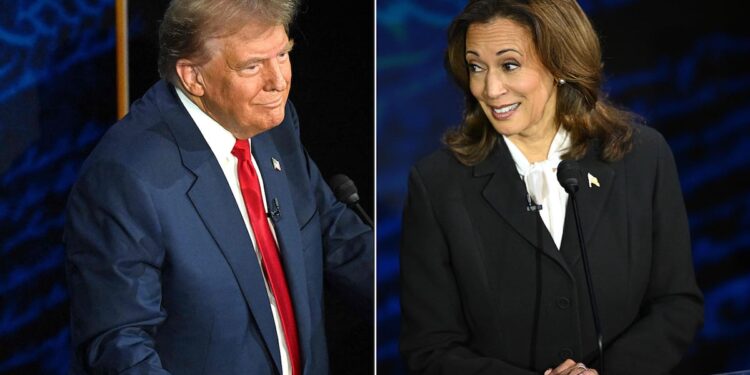Kamala Harris and Donald Trump each travel to contested states on Sunday, the American vice-president trying to dispel doubts about her ability to mobilize traditional electorates crucial for the Democratic camp, and the former Republican president rehashing his anti- immigration.
• Also read: Voting intentions: Harris is doing worse than her predecessors among visible minorities, according to a poll
• Also read: As US election approaches, businesses prepare for higher tariffs
A little more than three weeks before the November 5 vote, the polls are still undecided, but several recent surveys reveal Kamala Harris’ difficulties in attracting votes among black and Hispanic electorates.
A survey New York Times/Siena College published Sunday gives him less than 60% of voting intentions in the Hispanic community, which would represent the lowest level for a Democratic candidate in 20 years.
She is only credited with a 19-point lead over her Republican opponent within this strategic electorate in several pivotal states, particularly in the southwest, such as Arizona or Nevada, or seven less than Joe Biden in 2020. and 20 fewer than Hillary Clinton in 2016.
The 59-year-old vice-president was on Sunday in Greenville, North Carolina (southeast), in a part with a large black population of this state won for the last time in 2008 by a Democratic candidate and recently devastated by the hurricane Helene.
In a church attended mostly by African-Americans, she saluted “the heroes and angels” revealed by this crisis, but denounced “those who divert people’s tragedies and sorrow into resentment and hatred” by “ spreading disinformation.
“It is insane to play politics by playing on people’s distress,” insisted Kamala Harris, in particular referring to Donald Trump’s assertions that the Democratic authorities have abandoned the populations of majority Republican areas to their fate.
“Stay home or vote for Trump”
Former President Barack Obama reprimanded his African-American “brothers” who were reluctant to elect a woman for the first time in American history in the key state of Pennsylvania (north-east) on Thursday.
Jim Clyburn, an African-American elected representative from South Carolina to the House of Representatives, told CNN on Sunday that he was “worried that black men could stay at home or vote for Trump” on November 5.
Another supporter of Kamala Harris, Bill Clinton campaigned on Sunday in Georgia, another disputed state on the Atlantic coast. The former Democratic president, still considered very popular with the black electorate, also spoke in a church attended mainly by African-Americans.
Outgoing President Joe Biden visited Florida, hit successively by hurricanes Helene then Milton.
“It is at times like this that we come together to help each other, not as Democrats or Republicans, but as Americans,” Joe Biden said in a disaster zone, who signed the major disaster declaration the day before.
Donald Trump, for his part, is due to speak at a rally in Arizona, a border state where his anti-immigration rhetoric is popular.
His running mate on the Republican ticket, JD Vance, imperturbably defended the ex-president’s speech on immigration or on the management of hurricanes, accused of exaggeration or even fabrication by his detractors.
Faced with natural disasters, “Americans feel abandoned by their government, and they are,” said JD Vance.
He also criticized the outgoing Democratic administration for having “let millions of people in, most of them without verification,” according to him.
At a rally Saturday evening in Coachella, California, Donald Trump accused Kamala Harris of having “orchestrated the invasion of America.”
He once again promised mass expulsions upon his return to power and heavy prison sentences for illegal immigrants.
“We will defend our civilization. We will not allow ourselves to be conquered, we will not allow ourselves to be occupied. We will recover our sovereignty,” insisted Donald Trump.
After these few days of remote duel, the two candidates must meet on Monday in Pennsylvania, considered vital by each of the two camps to open the way to the White House.



